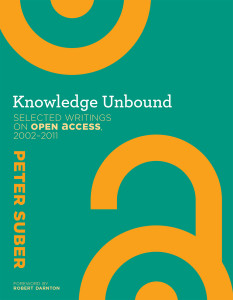New Open Access Book – ‘Knowledge Unbound: Selected Writings on Open Access, 2002–2011’ by Peter Suber
Peter Suber is one of the leading figures in the open access movement and current director of the Harvard Office for Scholarly Communication. Last week saw the publication of his most recent book Knowledge Unbound: Selected Writings on Open Access, 2002–2011 published by MIT Press. The book is available to freely read and download in a range of formats from the publisher’s website with a foreword by Robert Darnton.
Back in 2001, while still a professor of philosophy at Earlham College, Suber undertook a sabbatical from his teaching duties mainly with the intention of focusing on his academic research. During this time, he became increasingly interested in the web’s power for sharing scholarly writing, starting his own weekly newsletter on the subject. As the popularity of the newsletter rapidly grew, so too did Suber’s interest in open access, leading him to spend ‘every hour of my work day, plus many other hours’ working on the topic. The newsletter soon became a blog entitled ‘Open Access News’, from which most of the book’s contents are taken. Suber left Earlham in 2003 and has worked full-time on open access ever since.
The book covers Suber’s writings from the early days of the newsletter through to 2011 – a time of huge change for open access to knowledge across the world. During this time, open access went from being an extremely niche activity to something that is near impossible for the average researcher to ignore. The book features sections on the case for OA, understandings of OA, disciplinary differences and what the future might hold, all written in an approachable and conversational style.
For policymakers, there is a whole section on funder and university policies for open access that contextualises Suber’s excellent guide (co-authored with his colleague Stuart Shieber) on Good Practices for University Open-Access Policies. Harvard’s 2008 open-access policy was the first OA policy in an American university and the first faculty-led (rather than administrator-led) policy.
Coupled with his concise introductory 2012 book Open Access (also MIT Press) the two works should offer an excellent introduction and a compelling case for open access publishing.
 Open Access Working Group
Open Access Working Group 


Thanks, Samuel. I appreciate your kind words. One small correction: Most of the pieces came from my newsletter, not my blog. None came from my blog.